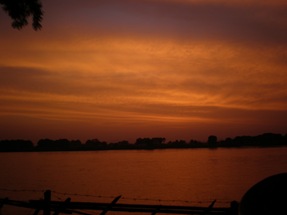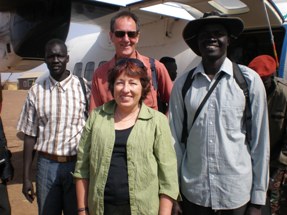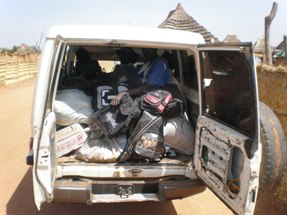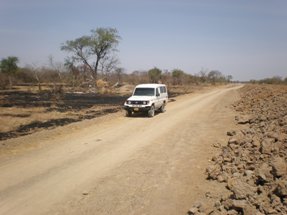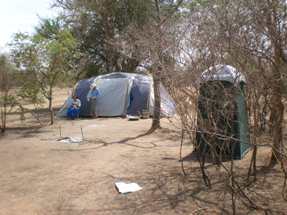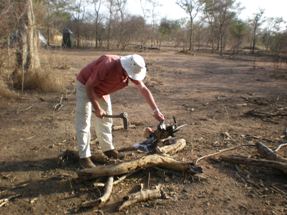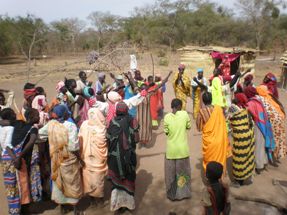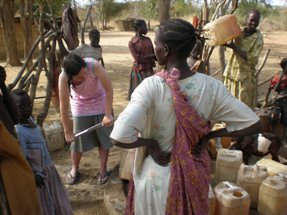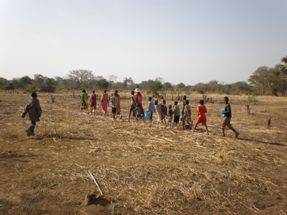My wife, Lynda, and I arrived in Juba on 31 January 2008. Fortunately we were met at the airport by Ngor Ngor Kuany a supporter of Timpir and its objectives in South Sudan. Ngor drove us to our accommodation for two nights at Sunflower on the banks of the Nile. Sunflower is a camp (for lack of a better descriptor) that accommodates and feeds mainly foreign aid workers. The accommodation was spartan and the food plentiful. Dawn over the Nile was superb!
After two nights we boarded our last airborne leg to fly to Awiel where we had arranged to be met by Kuol Baak. The flight was uneventful and the vista of South Sudan below us was lost in the haze. While we taxied in we could see Kuol waiting by the airport building.
Kuol finally managed to arrange a vehicle to transport us to Wäramoth but we had to stop at the market in Awiel with the Timpir shopping list. The market was busy, hot and, we later discovered, quite expensive. Having purchased 49 mosquito nets, 19 blankets, some school bags, a rooster, bottled water and 50 kgs of sorghum flour we set off for Wäramoth.
Most of the trip was on a dirt highway which was interrupted occasionally by an occupied or abandoned compound in its path which necessitated a rough detour. The trip took about three hours, the last of which was on paths suitable for pedestrians or bicycles but not really for ancient four wheel drive vehicles.
Kuol and Mel had established their own temporary “home” next to Kuol’s parents’ compound with a tent, latrine and shower tent which we shared with them. When we arrived the latrine was just a hole in the ground which Kuol and I completed over the next few days.
Our first evening was spent preparing the rooster for our dinner as Kuol’s family left us to catch up with Mel and Kuol. I resurrected my childhood chicken slaughtering and dressing skills and soon we had a muscular rooster on a spit over the camp fire. The damper which was to accompany it was a disaster but the rooster and onion stuffing were superb.
The next two days we spent greeting the locals (and some not so local) who came to pay their respects to the “parents of Amel”. On Monday we had a big party hosted by Kuol’s family for which much kisira was cooked, a goat was slaughtered and the Sudanese sorghum based beer was brewed. After feasting, drinking and dancing everyone declared the day a success. Kuol enlisted the aid of some young Wäramoth men to help him to “mud in” the wall of the goat shed where his mother had recently interrupted a hyena’s attack on a goat. The water had to be carted from the well some 20 minutes bike ride away to put into the mud pit to make the mud. It was an arduous task that no doubt prepared Kuol for building the school extension a few weeks later.
While the work was progressing we were drinking bottled water form the tent. With shade temperatures at 38-39°C the water temperature was almost OK for making tea! We made some Coolgardie safes from wet socks hanging in trees to cool the drinks. Our only water supply for cooking and washing was also from the well which Mel and the girls of Kuol’s family fetched from the well in the mornings and evenings.
Abuk Atak Ngeny, Kuol’s mother, had organised for those in need of Christmas gifts to come to the compound so our days were filled with talking to visitors, presenting the gifts and recording the occasion. Some had walked for up to five hours to receive their gifts.
We walked with Mel and a gaggle of children to visit needy neighbours within walking distance. Many of these people were “returnees” who had returned to the area and reclaimed some land after years in exile in refugee camps or in Khartoum. These people are situated even further from the well and usually consisted of husband and wife and small children. Trying to grow enough to sustain themselves while having to cart water from the well (which may take 5 hours or so per trip) and care for a young family makes life very difficult for them.
None of the compounds in the area have water other than what is carried from the well. None have electricity — they cook on wood fires and some have battery powered torches which are used sparingly. None have toilets — the bush is nearby and it all gets washed away in the wet season. Most have bathrooms where daily ablutions are performed from a bucket.
Our overall impression after nearly two weeks in South Sudan is that, while the infrastructure of even the capital city, Juba, lags the western word by over 150 years, the people are tough, resilient and totally dedicated to rebuilding their lives in their homes which many of them are seeing free of civil war for the first time in their lives.
The work of Timpir in South Sudan hardly scratches the surface of the need that is evident everywhere. However, the Christmas gifts have made a huge difference to those few fortunate enough to receive them and the school will provide education and nourishment for the children of the area who will eventually determine its future. We can only be grateful that we have been given such an opportunity to help them.
Henry Kutek

